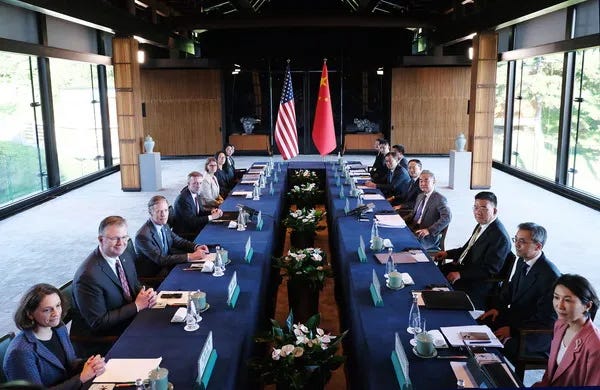China and the US agreed to hold the 2nd intergovernmental dialogue on AI
China's press release of the Sullivan-Wang Yi dialogue indicated there would be a 2nd bilateral AI dialogue:
Here is the translation of the press release:
From August 27 to 28, 2024, Wang Yi, a member of the Political Bureau of the CPC Central Committee and director of the Central Foreign Affairs Office, held a new round of strategic communication in Beijing with U.S. National Security Advisor Jake Sullivan. They engaged in candid, substantive, and constructive discussions.
Wang Yi emphasized that China-U.S. relations have experienced ups and downs, and reviewing the lessons learned can help pave the way for a better future and find the right way for the two major powers to coexist.
1. The key to maintaining the right direction in China-U.S. relations lies in the guidance of the two countries' leaders. Both sides should adhere to the principles of mutual respect, peaceful coexistence, and win-win cooperation to promote the stable, healthy, and sustainable development of bilateral relations.
2. Avoiding conflict and confrontation is crucial, and this requires adherence to the three joint communiqués. It's important to uphold the political foundation of diplomatic relations, respect China's sovereignty and territorial integrity, and recognize the legitimacy of China's political system and development path.
3. Smooth interaction between the two nations is contingent on mutual respect and equality. Approaching relations from a position of strength is not the correct way for nations to engage with each other.
4. Long-term stability in China-U.S. relations depends on consolidating public support. Building more bridges and avenues for people-to-people exchanges is essential, rather than creating barriers.
5. Achieving peaceful coexistence requires correct understanding. China is committed to improving the lives of its people domestically and contributing more to global peace and development. The U.S. should not impose its own experiences on China or view China through the lens of "might makes right."
Wang Yi also introduced the spirit of the 20th CPC Central Committee's Third Plenary Session, highlighting it as a new milestone in China's reform and opening up, offering new perspectives for understanding China and new opportunities for shared global development.
He stressed that Taiwan is part of China, and China will inevitably achieve reunification. "Taiwan independence" poses the greatest risk to peace and stability in the Taiwan Strait. The U.S. should fulfill its commitment to not supporting "Taiwan independence," adhere to the one-China principle and the three China-U.S. joint communiqués, stop arming Taiwan, and support China's peaceful reunification.
Wang Yi pointed out that security among nations must be collective, comprehensive, cooperative, and sustainable. National security should not come at the expense of other nations' security. The U.S. should stop its economic and technological suppression of China and refrain from harming China's legitimate interests. Using "overcapacity" as an excuse for protectionism will only harm global green development and affect world economic growth.
He reiterated that China firmly upholds its territorial sovereignty and maritime rights in the South China Sea, and maintains the seriousness and effectiveness of the Declaration on the Conduct of Parties in the South China Sea. The U.S. should not use bilateral treaties as an excuse to undermine China's sovereignty and territorial integrity, nor should it support or condone the Philippines' infringement activities.
Jake Sullivan stated that while the U.S. and China have differences and competition, there are also many areas where cooperation is necessary. He agreed that the two sides should treat each other equally and that competition should be healthy and fair. The U.S. has no intention of decoupling from China. The U.S. adheres to the one-China policy and does not support "Taiwan independence," "two Chinas," or "one China, one Taiwan." The goal of U.S. policy is to find a way for U.S.-China relations to develop sustainably. The U.S. is willing to maintain strategic communication with China, enhance mutual understanding, and reduce misunderstandings and misjudgments.
The two sides also exchanged views on issues such as Ukraine, the Middle East, and the Korean Peninsula. Wang Yi emphasized that China is always committed to promoting peace talks and pushing for a political solution to the Ukraine crisis. He stressed that the U.S. should not shift responsibility onto China or impose illegal unilateral sanctions.
The two sides discussed recent interactions between their leaders and agreed to continue implementing the important consensus reached at the San Francisco meeting between the two heads of state. They agreed to maintain high-level exchanges and communication at all levels, continue cooperation in areas such as drug control, law enforcement, and the repatriation of illegal immigrants, and respond to climate change. They also agreed to arrange timely video calls between the leaders of the two militaries' theaters and the second round of China-U.S. intergovernmental dialogue on artificial intelligence.


